


Webmaster
Intrada The White Buffalo review
Reproduced here (as restored from Film Score Monthly thread):
Good news and bad. The Good: Prometheus issues World Premiere Release of original soundtrack from J. Lee Thompson western drama starring Charles Bronson as Wild Bill Hickok. Barry's dark, dramatic score plays to moodiness of picture, captures images of massive, symbolic animal and Native American settings. Lean strings, expressive French horns, solid percussion riffs are highlights.
The Bad: Outer packaging somewhat deceptively mentions source material as "best available". Inner packaging notes "archival" status, unavailability of multi-track masters and mentions a pair of tracks having traces of faint dialog. In actuality, anomalies exist throughout, suggesting some tracks transfered from production tapes used by music editors, etc. Additional liability: pinched mono sound. WHITE BUFFALO is important John Barry music, foreshadowing more-celebrated work ahead. This limited edition album is - however - a disappointment.
Review of the expanded You Only Live Twice
Andy Dickenson
22 February 2003
![[John Barry and Lewis Gilbert - director]](/images/scans/t_barrylewisgilbert.jpg) Not to be beaten this time, I was able to get hold of Thunderball and You Only Live Twice at Cinema Store before they sold out. Worth the extra to avoid the wait. Since I've always fancied a sort of review, I thought I'd share my reactions with you (as nobody else has beat me to it, yet!)
Not to be beaten this time, I was able to get hold of Thunderball and You Only Live Twice at Cinema Store before they sold out. Worth the extra to avoid the wait. Since I've always fancied a sort of review, I thought I'd share my reactions with you (as nobody else has beat me to it, yet!)
Another reason is that You Only Live Twice holds a special place in my heart. In many ways it's one of my favourite Bonds. I just like the bigness and the outrageousness and have a fondness for all things oriental. And in some ways it's my favourite Barry Bond. Add to that it would have been the first Bond that I remember seeing in the cinema at the tender age of 9.
I haven't listened to the original YOLT tracks yet, but checked to see if the gunbarrell was preceeding Capsule in Space. It isn't. Strange this, as it was done on OHMSS. Time or technical reasons, I wonder?
The bonus stuff (timings are approximate and are derived from me remembering to look at my walkman at the right moment!)
13 James Bond in Japan
At 10.50 a very long piece, which comprises the pre-credits stuff (minus Capsule), the funeral at sea and subsequent Japan walkabout. Also the stuff to do with Henderson and Osato's place. This is a very varied suite and covers a lot of screen time. But it holds together musically extremely well and seems shorter. This track alone proves why it's such an accomplished score. Hard for people to sequence thought, given the gunbarrel addition.
14 Aki, Tiger and Osato
5.42 Begins with an alternate, unused 'Kobe' type arrangement of the theme. Goes on to include Bond's 'capture' by Tanaka, the bath and massage and his return to Osato chemicals. The massage bit is very sensuous and mysterious. A real 'goose pimple' piece.
15 Little Nellie
3.44 speaks for itself. All of the Little Nellie music. A great version of 007. Together with snippets of the Bond theme earlier, reminds one of how little these were represented on the original album.
16 Soviet Capsule
2.04 Differs only slightly from Capsule in Space (shorter). Useful for completists!
17 Spectre and Village
3.44 Actually begins with the descent of the Soviet capsule. Then we have the exciting Piranha bit before going into the Ninja assassin sequence, Bond's transformation and the delicate and affecting 'nightfall' music when Tanaka announces the change of launch date. Very satisfying mix.
18 James Bond - Ninja
7.06 Bond's volcano incursion, knock-out of the astronauts and the crater guns. On into the 'smoking gun' and then..... a very peculiar and funny 'coda' which is difficult to imagine anywhere in the film! You have to hear it to judge. Just a few seconds.
19 Twice is the only Way to Live
2.49 This was on the UK vinyl version and is, for the most part, the same as the vocal end music but with a lush instrumental replacing Nancy! The ending is both peaceful and then triumphant! An achievement.
Altogether, like Diamonds, the pleasure of the score doubles with this expanded version, as does the realisation of the versatility of the music. Unlike Diamonds though, the original was a full and satisfying classic in it's own right. I remember getting the vinyl import (which I still have).
What listening to this made me think was ... how the editing of the music came/comes about. Someone has spoken of a 'musical advisor' brought in by Saltzman. Was it this person? Or Barry? Or Gilbert? But is striking how bits of the score are lifted and inserted into the film at odd moments. Sometimes clumsily. And there is the music not used in the film. If this is at all to do with Gilbert, then it makes one wonder if there are unheard gems in the Moonraker masters.
Altogether a lush, sensual, lyrical yet action-packed score. Wonderful to have. I know Barry doesn't waste much effort examining his approach to these films, but I for one would be fascinated to know what 'turns him on' about certain Bonds (and vice versa) given the terrific turns for such widely different films as Thunderball, OHMSS, YOLT, Diamonds and Moonraker.
That's what I would request Geoff to try and delve into.
All best, everyone. Get it as soon as you can and enjoy! The only sadness is that that's it..... for now!
Andy Dickenson
Review of the expanded OHMSS
Matt Manning
7 February, 2003
I shall now attempt, as far as I'm aware, something of an internet scoop - a review of the expanded OHMSS. Just spent the whole night listening and re-listening to it and I'll start by confidentally proclaiming this CD to be one of THE greatest John Barry CD's there has ever been!
As you know, they've kept the original abum sequence followed by the previoulsy unreleased cues. To my surprise, I discovered they have expanded 4 of the tracks in the original album sequence - "This Never Happened To The Other Fella" (which now begins with the gunbarrel logo Bond music), "Ski Chase" (which extends to the music immediately after the avalanche), "Over & Out" (which, instead of fading out, goes the full distance to the brassy punchy end) and "Journey To Blofeld's Hideaway" which is complete (the "We Have All The Time In The World" march which cuts in half-way through on the original album is now the second half of the new track "Journey To Draco's Hideaway". Following me so far? Good!)
As if the unreleased sections of score now appearing in clear, crisp magnificent CD sound quality wasn't good enough, many of these bonus tracks feature music we've never heard before EVER! "Bond Settles In" (when Bond is being shown his room at Piz Gloria) extends far longer than what we hear in the film (with echoy, tinkering piano a la "The Last Deadfall"). "Dusk At Piz Gloria" is completely new and "Bobsled Chase" is in its entirety. The brilliant "Gumbold's Safe" also features a short moment never heard before (presumably meant for when Bond steps out onto the balcony to collect the safecracker) and it was worth staying alive this long to finally hear this superb track on CD.
The cable-car section of "Blofeld's Plot" sounds like it has been edited down but all the musical ideas present in the film cue are here (you'll hear what I mean). As far as I can tell, the only previously unreleased cue NOT present is the ice-rink waltz (when Bond is chased into the village and Tracey rescues him). I'd hazard a guess that they decided not to include this 'source cue' so they could squeeze ALL of the dramatic score onto the disc which, incidentally, runs for 79 minutes and 48 seconds.
The front covers are the same as the original albums but the CD case spines are seethru and black (sporting the words "James Bond 007 remastered") and obviously the back covers are different now with the new tracklistings.
Well now you can set your minds at ease. This CD is as great as it should be. It was worth the wait!!!
I'll spend all of TOMORROW night going through "Diamonds Are Forever"!
Matt
Review of the expanded Diamonds Are Forever
Matt Manning
8 February 2003
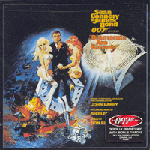 After the sheer delight of finding the expanded OHMSS to be as good as I (and indeed ALL of us) had hoped it would be, I was expecting an equally fantastic ride with the new DAF and wasn't disappointed. Basically, everything you're hoping with this CD has been met, ALL the music you've been waiting for is now here so instead of me waffling on about how good each track is (you all know how good it is!) here's just a run-down of how they've structured this new CD (with some humble comments and conclusion from me).
After the sheer delight of finding the expanded OHMSS to be as good as I (and indeed ALL of us) had hoped it would be, I was expecting an equally fantastic ride with the new DAF and wasn't disappointed. Basically, everything you're hoping with this CD has been met, ALL the music you've been waiting for is now here so instead of me waffling on about how good each track is (you all know how good it is!) here's just a run-down of how they've structured this new CD (with some humble comments and conclusion from me).
Again we have the original album sequence followed by the bonus material and they have added new music to 6 of the original album tracks. Right from the word go as well: the Shirley Basey song is the one heard in the film opening with the huge clash of brass before gradually settling into the song proper. (The remastered sound unearths some extra instrumentaion I never knew was there before!)
"Bond Meets Bambi & Thumper" extends to the fight music as they throw him into the swimming pool (yes, at last, THAT long-lost fight music: you're gonna get no less than 3 renditions of it on this album).
"Moon Buggy Ride" now begins with Bond stealing the moon buggy from the astronaunt-training stage.
"Death At The Whyte House" opens with the eerie 'mountaineering outside the Whyte House' music.
What was previously just a second instrumental of the main theme is now "Diamonds Are Forever (Bond and Tiffany)" which bookcases the cruise ship lounge piece with the Wint & Kidd motif and the climatic fight between them and Bond.
And "To Hell With Blofeld" encompasses ALL of the music from the oil rig scenes before launching into the old "007" climatic battle music. Even before getting onto the rest of the bonus stuff, this new version of the old album alone demonstrates how gobsmackingly CRAP the score was represented on the original release!!!
The titles of the bonus tracks are all pretty much self-explanatory - what you think they might be, they ARE! ALL the music is there! "Slumber Inc." incoporates all the wonderfully delirious cremetorium music (the first time a choir was used in a Bond score?) and listening to it up-close makes me convinced it's "Mary - Queen Of Scots" in disguise!
The "Additional and Alternate Cue" track comprises of Wint & Kidd visiting Mrs. Whistler, an alternate "Bond Meets Bambi & Thumper" and alternate escape music after "Moon Buggy Ride" followed by source music from the Circus Circus scene (Tiffany at the shoot-the-balloon stand and even the metamorphosising gorilla cage! Yeeees!).
Hearing all this together on the same CD, I was struck for the first time by how wildly varying and tongue-in-cheek the whole score is (all that jazzy casino music, the quasi-religious cremetorium music, the Circus Circus music, the fights, the chases, the sex, the outer space music) and yet how superbly it all seems pulled together as a coherent whole! DAF is a score that demonstrates how amazingly versatile but, at the same time, unmistakably unique Barry could be under one roof!
Matt.
Enigma review on Filmtracks
Enigma review
14 April 2002
Soundtrack Review of Enigma
Soundtrack Net review of Enigma
23 May 2002
Enigma Review
(by James Southall)
 Attractive but surprisingly uninspired-sounding thriller score.
Attractive but surprisingly uninspired-sounding thriller score.
John Barry fans have for many years had to deal with taunts that all of his scores are alike, a notion that is of course ludicrous. But the signs are that finally he has succumbed to the ultimate laziness because his two 2001 projects, Enigma and the concept album Eternal Echoes are so predictable that it's difficult to get as excited about them as about new Barry works in previous years. Enigma should be the most inspiring film for Barry in ages - a spy thriller with an element of romance, it seems like the sort of movie he is born to score. But we get music that is so familiar, it is very difficult to see why Barry got so excited about scoring the film - surely if he had been that excited, he would have written something that would have reflected the energy and enthusiasm he had for the project?
While scores like Mercury Rising hardly set the world alight, this was essentially put down to the fact that Barry just wasn't inspired by the material, but quite frankly if he doesn't get inspired by Enigma then it is hard to see him ever getting that spark of inspiration for a project that has provided three of the best scores of the 1990s (and his career) in Dances with Wolves, Chaplin and Playing by Heart.
There is nothing wrong with the music, dramatically note-perfect for the movie. It's just that it sounds like recycled music from The Living Daylights and Mercury Rising and not like something Barry really cared about. The love theme is very pleasant but very minor in the annals of similar themes the composer has penned for other movies - a piano solo is accompanied by the usual wash of strings, but it's less pleasant and less memorable than even things like Simon's Theme from Mercury Rising or the theme from Indecent Proposal . Slightly more interesting is the version performed without the piano in "Is That What Happened?" Trivia note: the theme has exactly the same chord progression as Hans Zimmer's theme from Pearl Harbour but, even though the album is only now being released for Enigma , Barry wrote his theme long before Zimmer started work. It seems a bizarre coincidence that two film composers could have written virtually identical themes for movies about World War II in the same year.
Barry plays the tension and suspense in his usual way, with very simple brass ostinatos and gradually-building string accompaniment. Best is "The Convoy", almost six minutes long and by far the most impressive cue of its type on the album. Aside from this, there are basically just a series of repeats of the main theme, with very little variation. Yes, it is very pleasant, but no it is not pleasant enough to warrant such repetition without anything being done to it.
Ultimately, despite the complaints, Barry is a superb musical craftsman and it is great to see him back in the business after such a long period has elapsed since his previous score. After a string of rejected scores (one of which, Goodbye Lover, reportedly features heavily in Enigma ) and fall-outs with directors, it is good that he found a director with whom he did not have a problem working; bad, though, that he was hired pretty much without the consent of the director, whose choice of composer was David Arnold. Enigma is a good album, a good score, but the inspiration that formed the basis for all of Barry's best works just seems to have deserted him, and really there's nothing new here at all.
Robin and Marion (1976)
Robin and Marion (1976) is one of three simultaneously issued re- recordings of scores by John Barry on the Silva Screen label, the other two being The Lion in Winter (1968) and The Last Valley (1970). As the title suggests, the film tells the love story of Robin Hood and Maid Marion, but is a sequel of kinds, recounting events twenty years after the famous tales. It is a romantic, melancholy tale, and despite starring Sean Connery, Audry Hepburn, Richard Harris and Robert Shaw, failed to find an audience. There is a direct link to The Lion in Winter, the best of the three scores re-recorded by Silva, and indeed, the finest score Barry has ever composed, in that both films were written by James Goldman. Barry's music, while highly effective with the film itself, is not as effective an experience in isolation as the score for the earlier picture. The problem may be that it was a replacement, written in three weeks, when the original score by Michel Legrand was rejected by producer Ray Stark. Barry's score itself was partly reworked, with the American composer Richard Shores re-scoring some of the action music and reorchestrating Barry's 'riding motif'. This new album includes both Shores' rearrangements and Barry's original music in two versions of 'The Ride to Sherwood/The Ride to Nottingham'. The album also includes the Barry cues 'Over the Wall/Escape', replaced in the film by 'Trapped,' the one original cue written by Shore. It is obvious to anyone that Barry's work is superior, having a greater artfulness and subtlety. Inevitably Barry's famed romantic strings are much in evidence, though the melodic heart of the score is most memorably carried on a selection of wind instruments, flute, oboe, bassoon. The action cues are dominated by simple drumming, carrying a fatalistic portent and dramatic urgency. The central love theme has a beautiful poignancy yet is somehow not as memorable as the composer's very finest romantic melodies. It may be that the very obscurity of this score (there has never been an official soundtrack release) has elevated it in the minds of those who have not seen the film for a long time, so that as a self-contained album it somehow fails to inspire. Well crafted certainly, but not essential Barry. The performances are good, though the digital sound is so perfect it lacks a little character, missing that distinctive 1970's sound which made such Barry soundtrack albums as King Kong (1976) such a pleasure.
Gary S. Dalkin
![]()
Mark Hockley adds:
- After a score written by Michel Legrand was rejected by the film's producers, Oscar winning composer John Barry was brought in to save the day. Of course, without having the opportunity to listen to Legrand's original music, it's impossible to say whether Barry's contribution was an improvement. But whatever the case, to be frank this is not one of his more notable compositions, allowing for the fact that the music is never anything less than agreeable. Although the actual 'Main Title' is surprisingly dissonant and atmospheric, the true central theme is first introduced on 'The Ride to Sherwood/The Ride to Nottingham (Film Version)', a very typical Barry piece of melodic, lyrical romanticism, here incorporating a jaunty rhythm with plenty of percussive energy. However, this version was rearranged by Richard Shores in a higher key than Barry intended (at the request of those demanding producers), making it both a good deal livelier and lighter than the original (a version of which is also included on the disk). Certainly the original take is more sedate, but for me it works far better in the quieter moments, the orchestration more emotive and affecting. Setting aside this artistic discrepancy, the rest of the work is entirely dominated by this key theme, although more often than not it appears in more genteel romantic form ('First Love Theme', 'Second Love Theme' etc.) and these incarnations are very much in the composer's Somewhere in Time style, although unquestionably that wonderful theme was vastly superior. Even so, it's all still quite likeable in a refined and sweet-natured way. In other places we encounter this theme in more subtle variations, as with the pastoral 'Dawn in Sherwood', while what remains elsewhere only amounts to a few brassy, reasonably suspenseful pieces such as 'In the Church/This Way' and 'In Position/Preparation For Battle' and although these are effective enough they never really rise above being merely satisfactory. On the bonus side the sleeve notes are quite informative, although there is one amusing gaff when the credits proclaim that Will Scarlet was played by none other than Will Scarlett! A case of real typecasting it would seem (actually the role was performed by Denholm Elliott). Indeed, it's worth noting that this film featured some truly outstanding actors (Sean Connery, Nicol Williamson, Robert Shaw, Richard Harris and Ian Holm). The problem with this score and it applies to so many others, is its over reliance on a single motif. I've said it before and will no doubt say it on a regular basis in the future, but after a while even the most attractive theme can lose its appeal. The music ultimately lacks the depth and overall emotional texture that gives so much of Barry's best work real resonance. All the same, as with most of the output from this particular composer, there are always pleasing moments and it makes for a solidly enjoyable listening experience. Just don't expect this to figure near the top of your list of John Barry favourites.
Mark Hockley
Robin and Marian - review by James Southall
Deeply personal account of Robin Hood legend Robin Hood has appeared in cinemas many times: his most prominent appearances were in cinema's earlier days, when Erich Wolfgang Korngold applied his unmistakable style to Errol Flynn's swashbuckling antics; and then in more modern times, when Michael Kamen's thematically-strong but obviously-rushed action score accompanied Kevin Costner, supping with his father in 'Notting-HAM'. In the mid-70s, an oft-overlooked (not, it has to be said, without reason) take on the Robin Hood legend was released. Directed by Richard Lester and starring the dream partnership of Sean Connery and Audrey Hepburn, this time the film tried to be more serious and was set in the latter years of Robin Hood and Maid Marian.
Providing the score was John Barry. The politics that preceded that decision still rankle the parties involved today: director Lester hired French composer Michel Legrand to write the score for his movie but, after it was recorded, the movie's producer decided it wasn't commercial enough so turned instead to Barry, who had written music for Lester in the past but this time was very much hired against his will. To this day Lester mentions how much he hates Barry's score; he must be the only person who does. Barry is also never slow to aim a quick aside at Lester.
It hardly needs me to say that Barry emphasises the romantic aspects of the story above any other, but what may surprise listeners is just how incredibly dark much of the score is. The characters are in turmoil and Barry, always one to delve into the emotions of the characters in any movie he is scoring, represents this by his sometimes-brooding music. There is also a share of action music (more than would be expected in a Barry score) that is precisely written and orchestrated and very exciting.
Despite only having two weeks in which to write his score, the producer still found time to dislike certain aspects of Barry's music and tv composer Richard Shores was drafted in to write some generic action music for a couple of scenes. There is no coherent explanation for why this could have been. (One Shores cue appears on this recording and sounds very out-of-place - I wish it had been excluded.)
The cornerstone of Barry's score is his love theme, considered by his fans to be among his finest. It appears in a few variations, most poignantly in the very last cue on the album. It really is very beautiful, more restrained than similar pieces penned by the composers in more recent years, and arguably all the better for it. This recording is new, with the City of Prague Philharmonic conducted as ever by Nic Raine. The recording is tight and the performance precise: perfect for this score. Jon Burlingame's liner notes are brilliant (he's the best in the business) and Robin and Marian is another essential entry in Silva's burgeoning Barry collection, especially given that the score has never been available in any format before.
Robin and Marian - John Barry
MMMM
Review by Stephen Woolston
The troubled musical history of this film is famous. And understandable. The movie is an enjoyable affair but a narrative mess. Is it a sincere study of the sadness of old age? Is it making a nonesense of the construction of myths? Is it a good old British period comic romp? Or is it a love story? At different times it is each of these, but it doesn't know in which of these themes to rest it's final moral. It seems the creative forces involved - director Lester, writer Goldman, and producer Stark - all wanted to pull the film in different directions. Stark, in hiring John Barry to replace Michel Legrand's score, plays his ace card to finally win.
Ordinarily, a producer bringing in a composer to write a good old fashioned Hollywood romance score against the director's more profound conceptions would smack of the low brow. Barry himself is unlikely to have approached this any more profoundly than as a job of work. After all, his life was in a hurry, he had only two weeks and a producer's brief that said little more than 'don't get smart, just give me a love theme they'll remember'. Yet Barry pulls it off tremendously. His theme is one of the greatest love themes in cinema history. And the score has much more. Militaristic marches, pastorals for the country, and some dark study of the internal angers that drive the main characters. He successfully ignores the tug-of-war going on in the film to bring it the only unity the film has. This is one of those examples where, through a coherent music score, Barry most definitely improves an otherwise messy film.
The score was originally issued in short supply on a promotional LP, containing the two Barry cues that were replaced in the final film. It was, however, mono. A more recent bootleg CD was lifted from the isolated score track of the American laser disc, but this did not include the two unused tracks and presented the music with varying sound levels and crude cuts. This is a complete recording in stereo (Dolby Surround, in fact), and having the unusual advantage of being recorded from the original manuscripts, the score is captured in almost perfect form. Only in a very few places can you feel the difference. It clearly becomes the new champion for authenticity in Silva's repertoire. Jon Burlingame's notes reveal interesting facts about the score and Richard Shore's previously little known involvement. Another must-have for lovers of Barry, and for lovers of romantic film music in general.
Stephen Woolston
Contact the JB site
If you wish to send an email, for example with content for the website, please contact Geoff Leonard:
Email
This email address is being protected from spambots. You need JavaScript enabled to view it.
Location
Bristol, UK
Geoff (owner) and Ruud (webmaster) have been running the John Barry website since June 18, 2001.
This website is not endorsed by the composer's family.
Use of copyrighted materials and logos are for promotional purposes only.
All files on this website are for personal use only and cannot be bought or sold.
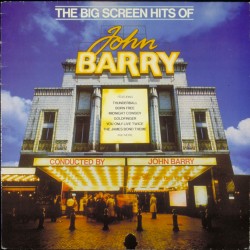
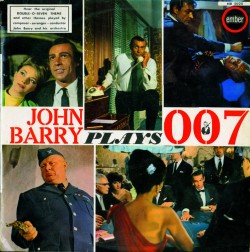
Our other sites
Geoff Leonard writes CD booklet notes, articles, and occasionally books, in partnership with Pete Walker. You can read more about this here:
Some albums
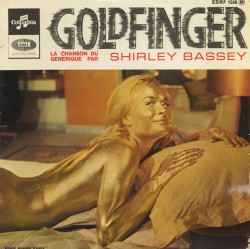
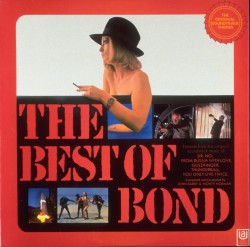
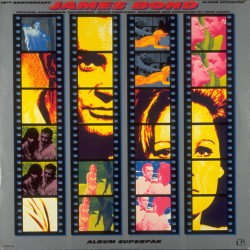
Events or Concerts
Submit your Event or Concert, This email address is being protected from spambots. You need JavaScript enabled to view it. We will not be responsible for any errors or inaccuracies.




